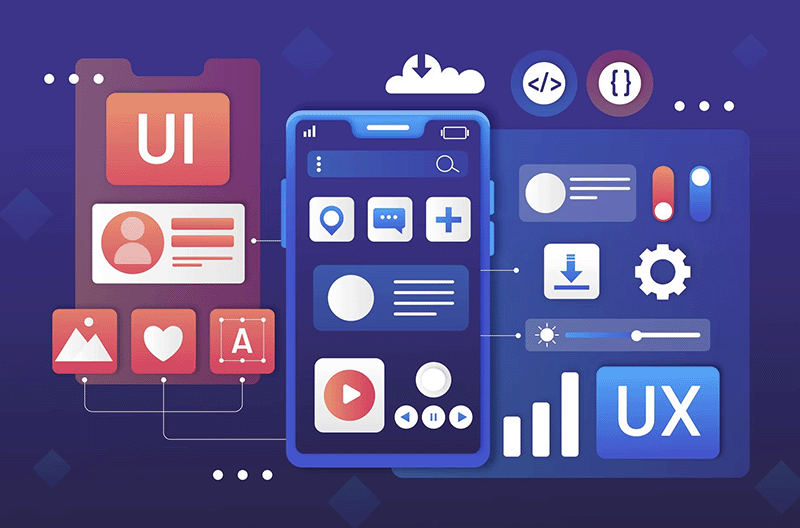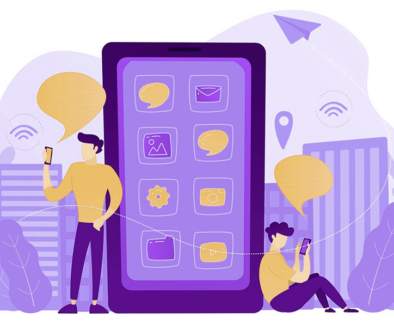The Challenging and Complex World of Mobile App Development Technologies

(and The Better Solution You Might Not Even Know About)
Mobile app development is an ever-evolving field with new technologies and trends emerging constantly. Businesses face the challenge of staying up-to-date with these advancements while also ensuring their app meets the needs of their customers and integrates seamlessly with their existing systems. Enterprise businesses also have the added complexity of dealing with large amounts of data and potential security concerns. Developing an app for an enterprise business is a significant undertaking that requires careful planning and consideration to ensure success. But it doesn’t have to be.
According to Gartner, there is no single solution to choosing a mobile architecture when building apps in your organization. Application and Software Engineering leaders will need to rotate between multiple architectures, including the progressive web app architecture, to build apps that deliver a great user experience.
But what if there is? More about that later. First, let’s review the different types of mobile app development technologies.
Different Kinds of Mobile App Development
The market for low-code, no-code, and intelligent developer technologies (LCNCIDT) continues to see strong demand from both professional and non-technical developers. A new International Data Corporation (IDC) forecast shows worldwide LCNCIDT revenue growing to $21.0 billion in 2026 with a five-year compound annual growth rate (CAGR) of 17.8% from 2021-2026.
The no-code, low-code, and intelligent development technologies competitive market includes the products that enable professional developers to work more quickly by streamlining or eliminating aspects of the development process and that expand the developer population by providing non-technical developers with development interfaces that abstract away some or all of the knowledge required to code in traditional development environments. According to IDC, the market is made up of the following.
Development Technologies
- Low-code development technologies, provide visually guided developer tools, drag-and-drop development interfaces, prebuilt code components and templates, and tools for modeling and integrating processes and data to accelerate and simplify the design and development of custom digital solutions. Low-code development technologies include application development platforms, Web development platforms, UI/UX components, and database-centric low-code application development platforms.
- No-code development technologies, provide visually guided, model-driven, and/or AI-driven technologies to enable the creation of software (apps, websites, etc.) by developers who do not have a technical background. No-code development technologies do not expose developers to command-line code. No-code development technologies include application development platforms, Web development platforms, and UI/UX design tools.
- Intelligent development technologies, leverage artificial intelligence and machine learning to accelerate software development or the development of AI-powered digital solutions. Intelligent development technologies include code autocompletion tools, AI development technologies, conversational AI development tools and platforms, and test automation.
Most organizations have developers with web development skills and want to build great mobile apps without sacrificing the code portability or deployment flexibility offered by web technologies. But rapidly evolving mobile web development tools make choosing the right approach difficult.
Organizations want to build apps with a full native experience, but fragmentation caused by multiple device types and operating systems (OSs) increases overhead development costs and delays releases.
Hybrid apps hold the promise of organizations to be able to build apps with access to native features while allowing new features and functionality to be added without resubmitting the app for approval. But many development teams struggle to create a good multiplatform user experience (UX).
Key Web, Native, and Hybrid App Challenges
According to research by Gartner, these are the key challenges businesses need to consider when building web, native or hybrid mobile apps:
- Deploy mobile web apps if the use case requires only limited or no native device capabilities and bring the app to market as soon as possible with the broadest reach. Build strong competencies with HTML5, Cascading Style Sheets Level 3 (CSS3), JavaScript, and JavaScript frameworks.
- Deploy PWAs to assist in narrowing the gap between web and native mobile apps by providing capabilities such as offline support, push notifications, home-screen icons, and full-screen view control without the need for containers such as Adobe PhoneGap or Apache Cordova.
- Build native apps if must-have use cases include high transaction rates, offline usage, and the ability to locally store and access large amounts of data by using cross-compiler development tools. This will reduce future maintenance and overheads.
- Build hybrid apps when must-have use cases include delivering a multiplatform app that allows the same HTML code components to be reused on different mobile operating systems while still accessing native device capabilities.
Through 2025, 90% of enterprises will use a combination of web, native and hybrid mobile architectures rather than a one-size-fits-all approach. So not only do businesses find it difficult to determine what kind of development technology they will need but, due to high demand, finding the right talent is also a huge challenge. This is one of the reasons Software Development Kits (SDKs) are an attractive option for businesses
Software Development Kit (SDK) Apps
Using an SDK for mobile app development can bring several advantages to the development process. Firstly, SDKs often provide access to pre-built libraries and tools that can be used to add functionality to an app, such as push notifications, social media integration, and in-app purchasing. This can save developers a significant amount of time as they do not have to build certain functionality from scratch. Additionally, SDKs can help ensure consistency across different platforms, as developers can use the same set of tools and libraries for both iOS and Android app development. SDKs also usually come with documentation and support from the company that created them, which can be helpful for developers who need assistance.
However, there are also some disadvantages to consider when using an SDK for mobile app development. One of the main disadvantages is the limited customization that developers may have with the limited functionality provided by an SDK. Additionally, developers may become dependent on the SDK provider for updates and support, which can be a problem if the provider discontinues offering support. Furthermore, including an SDK in an app can increase the app’s size, which can make it take longer to download and install, and can introduce security vulnerabilities if they are not kept up to date or if they have known issues that have not been addressed.
SDK Limitations
- Limited compatibility: Some SDKs may only be compatible with certain versions of an operating system or specific devices, which can limit the potential user base for an app.
- Limited scalability: SDKs may not be suitable for large-scale or high-traffic apps, as they may not be able to handle the load and may require additional resources to scale.
- Security vulnerabilities: SDKs may contain security vulnerabilities that can be exploited by attackers, which can put the app and its users at risk.
- Limited flexibility: SDKs may come with a fixed set of features and options, which can make it difficult for developers to adapt the app to changing requirements or user feedback.
The daunting task of hiring a dev team, the time-consuming challenge of building the right kind of app and the high costs of ongoing maintenance and tech stacks prove to be intimidating and confusing for most enterprise businesses. But it doesn’t have to be.
The Most Complete Mobile App Solution
Did you know there is an app option that allows you to skip hiring new employees, ditch the SDKs and not worry about scalability or ongoing support?
Introducing Bryj, the most complete enterprise mobile app solution that delivers faster and on budget in any app store worldwide with one subscription. From idea to ongoing success, the Bryj platform powers apps with a single source solution that seamlessly connects enterprise systems, provides intelligent analytics and Al, advanced UX marketing tools, and a world-class customer experience. You can trust that you will have everything you need to launch and maintain a successful app.
Our customers benefit from the ongoing support of our expert team, so you never have to worry about future OS or device changes, app store publishing, monitoring, or security. Let us handle the technical details so you can focus on growing your business. That’s right, no dev teams or agencies needed. That’s enterprise-level peace of mind. Schedule time today for a quick introductory call.


